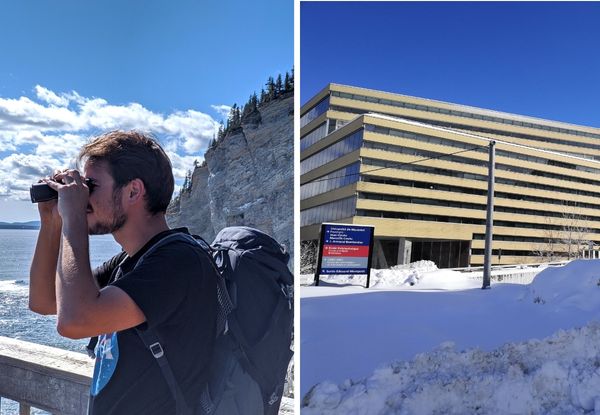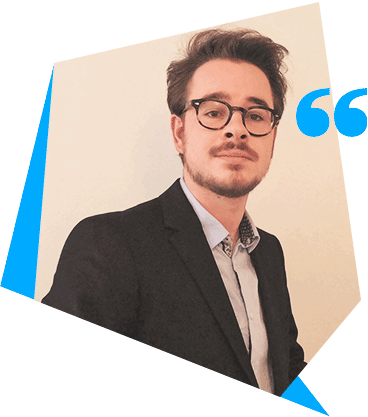< back to testimonials
2 years at Polytechnique Montreal
Published on
Morgan Demenois has been awarded a scholarship to study at Polytechnique Montreal in 2020. After 24 months, he completed a Master’s degree in Mechanical Engineering. He is still in Canada today and started working for Pratt & Whitney.

What were your motivations for going to Polytechnique Montreal?
From an academic point of view and before arriving at Polytechnique Montréal, I wanted to continue my training as a generalist engineer applied to aerospace that I started at ISAE-SUPAERO by choosing courses in different and varied fields. So I enrolled in aerospace engineering and selected courses in various fields such as computer science, electronics and mechanics. I also wanted to discover the culture of North America and to have an experience with their educational system, which is very different from the traditional one. I was looking forward to developing my independence and problem-solving skills by working on project-based courses with less supervision. This stay was also an opportunity to improve my English in a very bilingual city like Montreal. Finally, I wanted to discover a new country and take the opportunity to visit North American cities and explore the great outdoors and parks. I have been very attracted to the North American culture for many years, so it was a great opportunity to live there for two years.
Thank you to the donors!
Morgan Demenois

“I would like to thank the foundation for their help which allowed me to approach the beginning of my mobility more serenely and helped me to live this enriching experience both personally and professionally.
From a professional point of view, I learned to work independently and self-taught on my research project. Indeed, I had to work on many fields that I did not know such as artificial intelligence and machine vision. I learned how to carry out a project by myself by solving the various problems I encountered. I also continued to enrich my knowledge in fluid and solid mechanics and in numerical simulations. I also developed my teamwork skills. In particular, I had many interactions with the industrial partners and the other members of the project to develop an experimental setup corresponding to their expectations and needs. I worked extensively with suppliers, technicians, and workers at the school to purchase the materials for my set-up and to build it. Finally, I also learned to communicate and transmit my work and results to industrial partners, laboratory members and members of the scientific community with my thesis, my article, my presentations and especially by building a documentation allowing to use my experimental setup and my codes. On a personal level I have also learned a lot from working with the Anglo-Saxon culture. In particular, I have learned to be more patient with others.“
Tell us about your stay from an academic point of view
At Polytechnique Montréal, the double degree begins with an integration term during which you can choose your courses with more freedom. This term is used to choose the engineering in which you will specialize during the master’s degree. During this term, I realized that it would be impossible to reach a high enough level in all engineering fields and so I decided to specialize in my favorite field: mechanical engineering with fluid mechanics and solid mechanics. I chose mechanical engineering courses that could be useful in aerospace during my integration term.
The courses at Polytechnique Montréal have a much lower hourly volume than in France and require much more personal work. There is no “TD” like in France. The teachers present the course content during the session and it is up to the students to do the exercises independently at home. There are also a lot of projects to be done, usually in groups, and fewer big written exams. I did all my courses remotely because of Covid (from France with the 6 hour time difference during the first semester). The quality of the courses is generally good and each course goes more deeply into the subject than in France but has a less broad spectrum. Some of the teachers had recorded very good video lessons for the distance learning courses. During this integration term, I realized that these courses overlapped with the courses I already had at SUPAERO and by discussing with a professor I decided to do a research master’s degree rather than a professional one. So after the integration term I only had to take three courses (in addition to the four integration term courses) and I started working on a research project full time. It is a project comparable to a “mini doctorate” that leads to the writing of a thesis, possibly an article and an oral presentation before a jury.
I personally worked on a digital twin and supported by two industrial partners: Hydro Quebec (the equivalent of EDF in Quebec, which operates Quebec’s hydroelectric facilities) and Maya HTT (a service provider that develops digital tools for many industries). The long-term goal of this project is to obtain a method to simulate the “digital twin” of any system using machine learning methods combining sensor data and physical models of the system. This digital twin allows to optimize the operation of the real system, to plan maintenance and to predict incidents. To develop this digital twin we worked with a classical fluid-structure interaction experiment: the fire hose. It is a simple flexible tube through which a fluid flow runs at varying speeds. In spite of its apparent simplicity, it is a very rich system which allows to observe very complex fluid-structure interactions. My project consisted in the design and fabrication of an experimental set-up to observe the instability of a fire hose with high speed cameras. I also coded the program processing the images obtained by the cameras to extract the data and I conducted experimental campaigns to obtain data for the training of the digital twin.
I finally worked on building the digital twin of the pipe using neural networks, experimental data and the linear model of the pipe. My dissertation was nominated for the best master’s thesis and I am currently writing a scientific article on some aspects of my project.
I really enjoyed working on this project because it allowed me to have a first experience in academic research and to understand how research works. In particular, I learned how to conduct a literature review and how to write according to the rules of scientific publications. I was also able to work in teams and in English with other international students in the lab. Finally, I really enjoyed this project because it was very varied with an experimental component, a machine learning component, a computer vision component and also a fluid and solid mechanics component. I have learned a lot of things on my own in these different areas and I have developed my ability to work independently and to solve problems. Finally, this project allowed me to learn to work with the Canadian culture and to learn the differences with our way of working in France.

And from a personal point of view?
From a personal point of view I took advantage of my free time to travel and visit as much as possible the cities and nature of North-East America. Canada is a very big country and you don’t realize it until you get there, it takes years to visit everything! I also took part in many sports and cultural activities in Montreal. It is a very lively and cosmopolitan city with many music festivals (Jazz, Francofolie, Piknic Electronik…), public shows (circuses, fireworks…), art exhibitions and sports events (field hockey, baseball games…). It is a very green city with many parks that offer many sports opportunities in the summer (cycling, running or team sports) and in the winter (skating on the lakes, cross-country skiing…). We feel exactly in the middle of European and American cultures. There is a lot to do on foot, there are many activities and the food is the best in North America. The American culture with the atmosphere of the field hockey games at the Bell Center and the big buildings of downtown. It is also very easy to rent a car to explore Canadian parks and other cities. I love hiking and backpacking and have enjoyed the parks of Quebec, Ontario and North America. I also converted my French private pilot’s license to obtain my Canadian license. I enrolled in a Montreal flight school and continued to fly around Montreal and even over Montreal. Canada is a very attractive country for light aviation with less restrictive rules and many possibilities between seaplanes, skis for winter and flights in the north.


And culturally?
Culturally, Montreal is a very cosmopolitan city and the center of many cultures. She is very influenced by French and Anglo-Saxon culture. Quebecers are very welcoming, warm and kind, however it is difficult to make friends with them because they already have their own circle of friends and do not reach out to others. My circle of friends was therefore largely composed of French people on the move and a few rare Quebecers. At work or at university, the hierarchy is much less visible than in France, students are much closer to their teachers. The sandwich method (giving a compliment before and after a criticism) is very common and you have to be careful to be more diplomatic and less direct than in France. Quebecers do not like confrontation. In the university the classes are very large and there is no spirit of promotion as in France and most students stay in their groups of friends.
What were the highlights of your stay?
One of the highlights of this stay was the defense of my master’s project and the final submission of my thesis. This is the moment when all the bricks of the project come together and you can see the project as a whole. It was at this point that I realized how much work had been done and how much progress had been made during my year and a half of research. It was also at this point that I saw how much remained to be done to finalize this project in the very long term.
Another highlight of my stay was getting to go out for the first time in Montreal. Indeed I arrived in Montreal on February 3rd in the middle of the Covid wave and I had to stay totally confined in my apartment for two weeks. When I went out I finally discovered Montreal in the middle of winter, under a thick layer of snow and with temperatures close to -30°C. A change of scenery is guaranteed after several months of confinement!
What’s next?
Despite this good research experience I did not decide to continue with a PhD. Indeed, the functioning of academic research does not suit me, especially the system of scientific publications that I do not find healthy. I decided to go work in the industry and I wish to stay in Canada at least a few more years to finish visiting and discovering this great continent. The aerospace industry in Montreal is highly developed with the presence of many major players such as Airbus, Bombardier, Pratt & Whitney, MDA and many subcontractors. It is without a doubt the aerospace capital of Canada. I will apply for my Post-Graduation Work Permit in Canada allowing me to work for three years in Canada. I can apply for this permit because I graduated from Polytechnique Montreal. I accepted an offer as an engineer in mechanical testing and validation of engine components at Pratt & Whitney Canada in Longueuil where I started working in mid-October. I finished writing my scientific paper on my fire hose experiment which was submitted to the editor during November.
Thank you again!